Bloomsbury Studies on Thomas Aquinas (12 vols.)
Overview
Thomas Aquinas was the foremost philosopher and Catholic thinker in an era when the Church was Europe’s dominant cultural, political, and educational force. His influence continues to be felt both inside and outside the Church. The Bloomsbury Studies on Thomas Aquinas collection gathers the best in recent Thomistic scholarship. This comprehensive collection includes everything from introductions and surveys for those new to Aquinas, guides for reading his primary text, topical analysis of his theology and philosophy, and in depth looks at specific Thomistic concepts and their enduring influence.
Whether an advanced textbook or introductory volume, the best way to study these volumes on Aquinas is with Verbum. Seamlessly link these texts with Aquinas’ primary texts, as well as other studies on Catholicism and Christian ethics and Thomistic resources. Fully indexed texts enable you to cross-reference with a click and perform powerful searches by word or topic in these works, as well as the wealth of other resources already in your library.
Key Features
- The best in recent scholarship from leaders in Thomistic study
- Comprehensive set of resources for everything from introduction to in-depth study.
- Useful resource for personal enrichment or scholarly research.
Individual Titles
- On Aquinas by Herbert McCabe
- God and Evil in the Theology of St. Thomas Aquinas by Herbert McCabe
- Aquinas: An Introduction by Brian Davies
- Aquinas at Prayer: The Bible, Mysticism, and Poetry by Paul Murray
- Praying with Confidence: Aquinas on the Lord’s Prayer by Paul Murray
- Aquinas: A Guide for the Perplexed by Peter S. Eardley and Carl N. Still
- Aquinas’ Summa Theologica by Stephen J. Loughlin
- St. Thomas Aquinas by Vivian Boland
- Aquinas and the Ship of Theseus: Solving Puzzles about Material Objects by: Christopher Brown
- Thomas Aquinas & john Dun Scotus: Natural Theology in the High Middle Ages by Alex Hall
- Acts amid Precepts: The Logical Structure of Thomas Aquinas’ Moral Theology by Kevin L. Flannery
- Action and Conduct: Thomas Aquinas and the Theory of Action by Stephen Brock
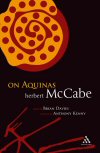
The revival of interest in Aquinas has corresponded with a rise of interest in Aristotle, on whose philosophy Aquinas based his own. On Aquinas is a masterly work of clear and concise exposition. By the use of simple modern analogy, McCabe brings Aquinas’ thought to life and underlines the crucial influence of Aquinas on our own contemporary thought. Even those who are unfamiliar with Aquinas will find this book gripping. Published posthumously, this study is thoroughly rewarding and will increase McCabe's reputation as one of Britain's finest theologians of recent years.
McCabe’s genius was for explaining. For the reader new to Aquinas, this makes for an accessible introduction. He does not shy away from technical vocabulary but explains it clearly, translating the key Latin terms with imagination and insight . . . For anyone interested in Thomas Aquinas, this is the book of the year.
—The Church Times
Herbert McCabe was a Dominican friar and theologian of outsanding originality. He has deeply influenced philosophers like Anthony Kenny and Alasdair MacIntyre and poets and writers like Terry Eagleton and Seamus Heaney. He died in 2001
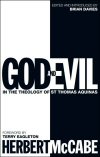
Herbert McCabe was one of the most original and creative theologians of recent years. Numerous volumes of unpublished typescripts left behind by him have been published following his untimely death in 2001. McCabe was deeply immersed in the philosophical theology of Aquinas and was responsible in part for the notable revival of interest in the thought of Aquinas in our time. Here, he tackles the problem of evil by focusing and commenting on what Aquinas said about it. What should we mean by words such as good, bad, being, cause, creation, and God? In answering these questions, McCabe demonstrates why evil does not disprove God’s existence. He also explains how we can rightly think of evil in a world made by God. McCabe’s approach to God and evil is refreshingly unconventional, yet it is also very traditional. It will interest and inform anyone seriously interested in the topic.
One of the distinct pleasures of studying the work of Herbert McCabe . . . is the brilliant wit and insight with which McCabe takes us from theological muddle to the blinding light of mystery . . . For the student who wants to uncover the deep structure of McCabe’s Thomistic theology, the present volume is invaluable
—Anglican Theological Review
Herbert McCabe was a Dominican friar and theologian of outsanding originality. He has deeply influenced philosophers like Anthony Kenny and Alasdair MacIntyre and poets and writers like Terry Eagleton and Seamus Heaney. He died in 2001
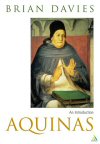
Aquinas was the ultimate combination of theologian and philosopher. His influence on Christian life and thought reaches from the Council of Trent to the Second Vatican Council and into the present day.
Brian Davies shows that Aquinas’ approach to the common questions of faith and existence is just as pressing and significant in our time. Here, the latest scholarship is incorporated with a clear and indispensable guide to Aquinas’ thought.
Brian Davies is professor of philosophy at Fordham University. His publications include An Introduction to the Philosophy of Religion and The Thought of Thomas Aquinas.
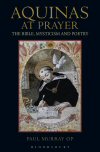
Aquinas at Prayer draws attention to important aspects of Aquinas’ life and work which have been all too often overlooked or forgotten. Today Aquinas is almost exclusively regarded as an outstanding scholastic philosopher and theologian. But what is little known is that Aquinas was, first and last, a teacher of the Bible. Moreover there is a distinctly mystical character to his theology. And, as a writer, he was arguably the greatest Latin poet of the Middle Ages.
The primary focus of this engaging new book is to explore the question of Aquinas’ own practice of prayer and his teaching on prayer in his commentaries on the Psalms and St. Paul. The book is strengthened by quotations from Aquinas in fresh translations.
Paul Murray is an Irish Dominican and a poet. He resides in Rome, where he teaches the literature of the mystical tradition at the Angelicum University.
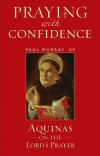
Those readers who, in the past, have found the study of Aquinas especially daunting, will be grateful to the Dominican Paul Murray for the freshness and clarity he brings to his task. Praying with Confidence is both a stimulating scholarly study and an ideal introduction for the general reader. Never before have the most important reflections by Aquinas on the Lord’s Prayer been drawn together and considered in a single book. Here, Aquinas comes alive not merely as a profound, speculative theologian, but also as an impressive master and guide of the spiritual and moral life. Aquinas also was a teacher capable of saying the unexpected, openly confessing, “. . . it is hardly possible to say a single Our Father without our minds wandering off to other things.” The style of Aquinas is plain and expository, but evident on every page is the serene, unmistakable mark of wisdom—Aquinas’ own, and that of the great tradition.
Murray abundantly demonstrates the spiritual force of Aquinas's teaching in this inspiring and accessible study.
—The Church Times
This book is just long enough to be read with ease, and to stir up our desire to pray with confidence and hope, but it also contains such richness that it will amply reward many meditative revisits.
—New Blackfriars
Paul Murray is an Irish Dominican and a poet. He resides in Rome, where he teaches the literature of the mystical tradition at the Angelicum University.
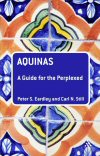
Aquinas is famous for his impressive and coherent synthesis of Greek philosophy and Christian theology. His magisterial Summa Theologica is a hugely important text in the history of philosophy. Nevertheless, he is also a very difficult thinker, and his ideas present a number of challenges to readers.
Aquinas: A Guide for the Perplexed is a clear and thorough account of Aquinas’ thought, his major works, and ideas, providing an ideal guide to the complex writings of this key thinker. The book introduces the key concepts and themes in Aquinas’ thought, and examines the ways in which they have influenced philosophical and theological thought. Geared towards the specific requirements of students who need to reach a sound understanding of Aquinas’ ideas, the book serves as a clear and concise introduction to his philosophy and natural theology.
Peter S. Eardley is assistant professor of philosophy at the University of Guelph. He has published widely on medieval philosophy, and in particular Thomas Aquinas.
Carl N. Still is associate professor of philosophy at St. Thomas More College, University of Saskatchewan. He has co-edited two volumes of essays on Aquinas, Being and Thought in Aquinas and Mind and Intellect in Aquinas.
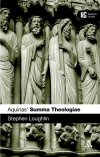
This reader’s guide to the Summa Theologica describes the context Aquinas’ compendium of Catholic theology emerged in, and seeks to guide the reader to an understanding as close to Aquinas’ originally meaning as possible. Loughlin also chronicles the history of how the Summa Theologica has been received, and the influence it has had through the centuries.
. . . a thorough guide through the hermeneutic conflict that surround the Summa, all of which is rigorously attested in the footnotes . . . a considerable achievement.
—The Expository Times
Stephen J. Loughlin is associate professor of philosophy at DeSales University, and coordinator of the Aquinas Translation Project.
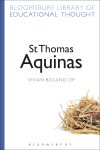
St. Thomas Aquinas
- Author: Vivian Boland
- Series: Continuum Library of Educational Thought
- Publisher: Continuum
- Publication Date: 2008
- Pages: 256
The Continuum Library of Educational Thought is a major international reference series providing comprehensive accounts of the work of seminal educational thinkers from a variety of periods, disciplines, and traditions. St Thomas Aquinas is indisputably a major thinker in education. Vivian Boland’s volume offers the most coherent account of Aquinas’ educational thought available. His volume contains a critical exposition of Aquinas’ work on education, and evaluates Aquinas’ historical impact and continuing influence.
Vivian Boland is director of the Aquinas Institute and a member of the theology faculty at Oxford. He also lectures in the Blackfriars’ Stadium on Moral and Pastoral Theology. He has authored several books on Aquinas, including Ideas in God According to St. Thomas Aquinas.
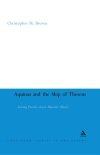
Thomas Aquinas has always been viewed as a highly important figure in Western Civilization, and the chief philosopher of Roman Catholicism. In recent decades there has been a renewed interest in Aquinas’ thought, as scholars have been exploring the relevance of his thought to contemporary philosophical problems. This book will be of interest not only to historians of medieval philosophy, but to philosophers who work on problems associated with the nature of material objects. Because human beings are typically understood to be a kind of material object, the book will also be of interest to philosophers working on topics in metaphysics. Although the work contains the kinds of details that are necessary for a work of historical scholarship, it is written in a manner that makes it approachable for undergraduate students in philosophy. It is a welcome addition to any scholar’s library.
Christopher Brown’s book, Aquinas and the Ship of Theseus, makes precisely the right kind of contribution to the literature. It is a timely and careful work, and it merits close attention—hence this extended critical study...It is interesting, well argued, and original, deserving a wide readership.
—Karin Boklund-Lagopoulou, professor of English literature, Aristotle University of Thessaloniki
Christopher Brown's study, Aquinas and the Ship of Theseus, is a straightforward philosophical discussion on the ontology of compound material objects... done in a highly accessible style that makes the presentation of complex issues easy to follow
—Patrick Toner, assistant professor of philosophy, Wake Forest University
Christopher Brown is an associate professor philosophy at the University of Tennessee.
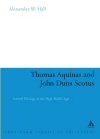
Thomas Aquinas and John Duns Scotus are arguably the most celebrated representatives of scholasticism’s golden age. They are known primarily for their work in natural theology, which seeks to demonstrate tenets of faith without recourse to premises rooted in dogma or special revelation. Scholars of this golden age drew on a wealth of tradition, dating back to Plato and Aristotle. Taking in the Arabic and Jewish interpretations of these thinkers, they produced a wide variety of answers to the question: how much can we learn of God? Some responded by denying us any positive knowledge of God. Others believed that we have such knowledge, yet questioned whether acquiring it required divine revelation. Scotus and Aquinas belong to the more empirically minded thinkers in this latter group, arguing against a necessary role for revelation.
Many scholars believe that Aquinas and Scotus exhaust the spectrum of answers available to this circle, with Aquinas maintaining that our knowledge is quite confused, and Scotus that it is completely accurate. In this study, Alexander Hall argues that the truth about Aquinas and Scotus lies somewhere in the middle. Hall’s book recommends itself to the general reader who is looking for an overview of this period in Western philosophy, as well as to the specialist. No other study on the market addresses this long-standing matter of interpretation in any detail.
In teasing out the hermeneutical and speculative differences between Aquinas and Scotus, Hall sharpens our view of the similarities between them. He also persuasively advances a more nuanced understanding of the questions driving natural theology at the height of the Middle Ages.
—Philosophy in Review
Alex Hall is assistant professor philosophy at Clayton State University. His most recent publication is Aquinas, Scientia, and a Medieval Misconstruction of Aristotle’s Posterior Analytics
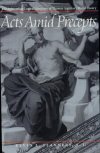
Although most theories of natural law recognize moral absolutes, there is not much agreement, even among natural law theorists, about how to identify them. Flannery argues that in order to understand and determine the morality (or immorality) of a human action, it must be considered in relation to the organized system of human practices within which it is performed.
In order to depict this structure and to explain how it affects the analysis of action, the author investigates a number of issues that have attracted the attention of Thomistic and Aristotelian scholarship. He examines the nature of practical reason, its relationship with theoretical reason, the derivation of lower from higher ethical principles, the incommensurability of human goods, the relationship between will and intellect, and the principle of double effect.
Kevin L. Flannery is professor of philosophy at the Pontifical Gregorian University in Rome. He has authored many works on ethics and the history of logic.
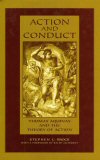
Action and Conduct: Thomas Aquinas and the Theory of Action
- Author: Stephen Brock
- Publisher: T&T Clark
- Publication Date: 2000
- Pages: 278
Through the works of Thomas Aquinas, Stephen Brock examines the relationship between conduct and physical action, or between the will and the real events which it effects in the world. Few thinkers have devoted more attention to this topic than Aquinas, who has influenced mainstream modern analytic philosophy through, among others, G. E. M. Anscombe, Anthony Kenny, Roderick Chisolm, and the late Alan Donagan. Demonstrating an exhaustive knowledge of Aquinas and contemporary theories of action, professor Brock provides a new interpretation of Aquinas’ thought on human action, and exposes the incoherence of theories which place an exclusive emphasis on the morality of subjective intention
Others may find reasons to dissent from Brock’s conclusions, but few will come to doubt the importance of his achievement. His treatment of Aquinas’ account of action exhibits a rare combinations of rigor and learning. It is, no doubt, the best we have.
—The Thomist
Both Thomistic scholars and analytic philosophers interested in theories of human action and accountability will find this book a welcome addition to their libraries.
—American Catholic Philosophical Quarterly
Stephen Brock is professor of medieval philosophy at the Pontifical University of the Holy Cross.
Product Details
- Title: Bloomsbury Studies on Thomas Aquinas
- Publishers: Bloomsbury, T&T Clark, Burns & Oates, Continuum
- Volumes: 12
- Pages: 3,005
- The best in recent scholarship from leaders in Thomistic study
- Comprehensive set of resources for everything from introduction to in-depth study.
- Useful resource for personal enrichment or scholarly research.
- Title: Bloomsbury Studies on Thomas Aquinas
- Publishers: Bloomsbury, T&T Clark, Burns & Oates, Continuum
- Volumes: 12
- Pages: 3,005
- Christian Group: Catholic
- Topic: Thomas Aquinas
Reviews
1 rating
JT
2/14/2015
This is a great collection, some quality resources on one of the West's leading theologians. Big disappointment that "The Bloomsbury Companion to Aquinas" has been removed from the collection. That really takes a bit of the value out of it as I was really looking forward to that book in particular. Nevertheless, it's still a pretty good collection - and the pre-pub price is reasonably good value too.